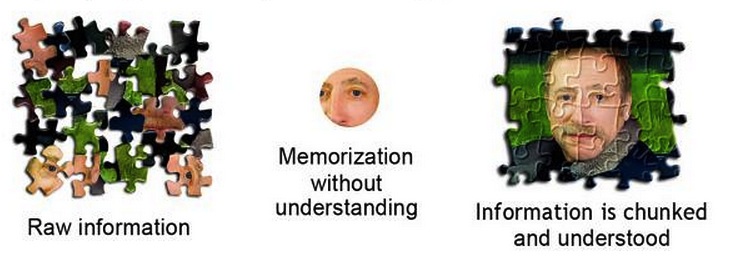Learning How to Learn
An Overview of Coursera’s Course on Learning
What is Learning
Focused versus Diffuse Thinking

Focused thinking is when we actively concentrate on the matter at hand. We are in an attentive state of mind and we often focus on a small set of information at at time. Diffuse thinking is when we let our mind wander freely. It is the type of thinking you engage in when you are ‘daydreaming.’ Both of these types of learning are important.
One way to ensure you enter diffuse mode from time to time is to take breaks during focused learning. A technique to accomplish this is the Pomodoro Technique. Basically you set a timer (for like 25 minutes) and perform focused learning during that time. After the 25 minutes is up, take a 5 minute break and allow your mind to wander.

One of the biggest traps we can fall into is trying to learn everything in a short amount of time. This is like a weight lifter trying to train his muscles for a competition the day before. It’s not going to happen. Your brain is like your muscles: it needs time to build itself up and make new connections. Approach learning like you do exercising: consistent work everyday is the only way to build a solid foundation.
Procrastination, Memory, and Sleep

Everyone suffers from some level of procrastination. One way to combat this is to use the Pomodoro Technique. Using the timer to ensure you actually have blocks of focused learning can help tremendously in combating procrastination.
To stave off procrastination, you should also minimize distractions. Find a quiet place to study and turn off your phone. Also, keep in mind that procrastination is often caused more from the pain of thinking about the thing you have to complete. Often, the process of getting things done is not as scary. If you can get yourself to just start the process, you’ll push way that pain of thinking about what you still have to do.

Your memory is made up of short term and long term memory. Long term memory is like a warehouse where you can store millions of things. However, getting things back can be hard. Short term memory is like a blackboard that is always slowly fading away. In order to store things in long term memory, you need to practice, practice, and practice what you are trying to learn. Just writing it on the blackboard will not make it ‘stick.’
Sleep is critical to learning. We still don’t know what exactly sleep does for us, but we know exactly what lack of sleep can do. Lack of sleep literally builds up toxins in your body and many of these can damage your brain.
Chunking
Chunking - The Essentials

Chunking is when you break up what you want to learn into smaller pieces. You can think of this as an analogy to a puzzle. The concept you are trying to learn is the complete puzzle. To solve it, you have to learn all the individual pieces and then put them together in the right way. The part of finding the individual pieces is chunking.
As you learn more and more chunks, you can make each chunk bigger and bigger. Chunks can also ‘transfer.’ What this means is that learning chunks in one area can actually help learn other things.
Seeing the Bigger Picture

Often times it is better to understand the big picture before starting to chunk the concept. Have you ever been in a math class where you just start learning equations and random relationships while having no idea what the whole point is? If you have, you’ve been victim to trying to solve a puzzle without even know what the complete picture is supposed to be.
The Illusion of Competence is when you trick yourself into thinking you know a subject. Some people will read and reread the material and do simple problems over and over again, thinking they are mastering the subject. Often times, they are kidding themselves. To really know a subject, you can do multiple things. Test yourself with difficult question. Also, test yourself across multiple sections rather than just sticking in one subject at a time. This is called interleaving and is shown to improve learning.
Einstellung is when you have become stuck in one way of thinking. It’s caused by a neural pattern that is ingrained in your brain. It’s hard to think about something in a different way because of this.
Procrastination and Memory
Procrastination

Remember, learning is like lifting weights: you can’t do it all in one day. Just like building muscle mass, changing the structure of your brain with new knowledge is a slow and difficult journey. Because it takes so long for real learning, you can’t save it all for the last minute. To help with procrastination, keep a journal. Set goals and write down tasks. This can add a sense of reward to knocking things off the lists. Also, do the hardest things first in the day. Whatever makes you feel most uncomfortable thinking about it, do that first.
Memory

Because it takes time and effort to move things into the long term memory warehouse, you should always start learning early. In order to do this, you should learn how to manage your procrastination.
As you get better and better in a subject, your short term memory becomes more efficient. This is because you can store ideas and new things in smaller chunks on the blackboard. You can think of this like compression. You are able to save the same amount of memory in smaller blocks.
One tool to help with memorization is to group things together with meaningful connections and also to use analogy and metaphor. Remember, even the most complex models in math and science are just glorified metaphors of the universe.
Renaissance Learning and Unlocking Your Potential
Summary
Metaphors and analogies aren’t just for art and literature. One of the best things you can do to not only remember, but more easily understand concepts in many different fields, is to create a metaphor or analogy for them. Often, the more visual, the better.
Try to avoid ‘genius envy’. Sure, intelligence is real and some people are smarter than others, but that doesn’t paint the whole picture. You don’t need to be a genius to work hard at mastering how to learn. And the person who spend the hard work learning things will always beat the smart person who does not apply themselves to anything.
Many people still suffer from imposter syndrome. This is when you feel inadequate and think everyone around you is so much smarter and you just haven’t been found out yet. The truth is almost everyone feels this way at times. That’s why the term ‘fake it till you make it’ is often good advice because almost no one is 100% confident in themselves.

When preparing for tests, study in groups. Studying with others helps you see the material in a different way, get asked questions you wouldn’t have thought of yourself, and also can help you learn even more by ‘teaching’ the material to others.
Conclusion
If you haven’t already, take Coursera’s Course on Learning. You’d be surprised how many little things people would think obvious or too simplistic can actually make a difference in your learning. Why would you not want to master a skill that will make all future skill learning easier?